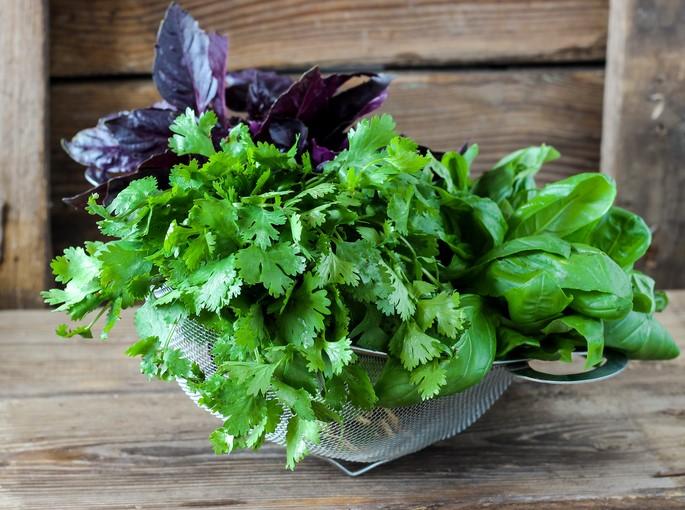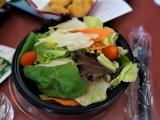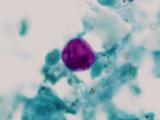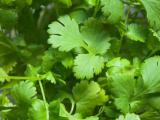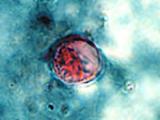The US Centers for Disease Control and Prevention (CDC) said yesterday that 2,173 lab-confirmed domestically acquired Cyclospora cases in 33 states were reported from May through August, markedly higher than the past 2 years, and that some of the illnesses reflect several restaurant clusters linked to contaminated basil and cilantro.
In a separate development yesterday, Food and Drug Administration (FDA) Commissioner Scott Gottlieb, MD, said that testing of bagged salad mix ingredients revealed two positive samples in domestically grown romaine lettuce, marking the second such instance involving US-grown produce.
Past outbreaks have involved a variety of imported produce, including basil, cilantro, mesclun lettuce, raspberries, and snow peas.
Illness clusters tied to basil, cilantro
The CDC said only 35% of the illnesses were linked to two large, high-profile multistate outbreaks, one involving prepackaged vegetable trays and the other salads sold at McDonald's. Some of the other illnesses were part of clusters involving other types of fresh produce, two involving basil and at least three others linked to cilantro.
Federal and state health officials investigated two basil-related clusters of 8 confirmed cases each in people from two states in the West and Midwest who were sick in June, and the CDC said the FDA's trace-back investigation of the basil linked to the clusters is still under way.
The cilantro-linked clusters, meanwhile, involve unrelated Mexican-style restaurants in the Midwest. The CDC said it received reports of 53 confirmed cases associated with the three clusters and that the FDA's trace-back probes are still ongoing.
The CDC said, however, that, aside from the outbreaks, the increase seen this year might also be related to increased use of a multiplex molecular assay to examine stool samples from the Cyclospora cayetanensis parasite. "CDC is working with state and public health partners to determine whether and to what extent changes in testing practices may have contributed to increased case detection and reporting."
The agency also noted that many cyclosporiasis cases could not be directly be linked to an outbreak, partly because there isn't a validated molecular typing test for the parasite.
Overall, illness onsets ranged from May 1 to Aug 24. Of the sick patients, 57% were female and the median age was 49 years. At least 150 people were hospitalized, but no deaths were reported.
Second detection in US produce
In FDA outbreak investigations and in its other produce safety efforts, a new FDA lab testing method has improved surveillance, including the first identification of the parasite in domestic cilantro, which the agency announced earlier this month, Gottlieb said yesterday an an update.
The cilantro that tested positive was part of ongoing sampling and was not linked to any illnesses. "Our domestic oversight efforts will evolve to confront this new risk," he said.
He said the trace-back investigation in the outbreak related to Del Monte vegetable trays, which sickened at least 250 people, was inconclusive, suggesting that the ingredients could have come from either domestic or imported sources.
An investigation into a Cyclospora outbreak tied to McDonald's salads sold at certain restaurants had revealed Cyclospora in an unopened package of bagged salad mix, and further investigation found that the products came primarily from domestic growers. According to the CDC, 511 people were sickened in that outbreak.
"During our investigation, two samples of domestically grown romaine lettuce were also found to be positive for Cyclosporaeven though they were not sourced from locations associated with the lettuce that was linked to this outbreak," Gottlieb said. He also added that none of the romaine that tested positive went into the marketplace and all of the produce suspected of being contaminated was destroyed.
"However, these findings are important as they represent the second time that Cyclospora has been identified in produce grown in the U.S.," Gottlieb said. He added that the smaller illness clusters linked to basil and cilantro fit a similar pattern with imported fresh herbs seen in previous years and that FDA testing also found Cyclospora in cilantro that was to be imported from two producers in Mexico. The FDA refused the shipments and took steps to prevent the firms' contaminated cilantro from entering the US market.
Gottlieb said the detection of Cyclospora in both domestic and imported produce raises both old and new concerns, underscoring the importance of FDA surveillance to better define the risks and the need to broaden tools such as import alerts to include domestic contamination events.
He said though the United States has one of the safest food supplies it he world, there's more that can be done when new patterns evolve, as with Cyclospora this summer. "Our system needs to be rigorous, nimble, and proactive in order to confront new challenges," Gottlieb said.
See also:
Sep 18 CDC update
Sep 18 FDA statement
Sep 4 CIDRAP News scan "FDA enhanced testing finds Cyclospora in imported and domestic cilantro"
